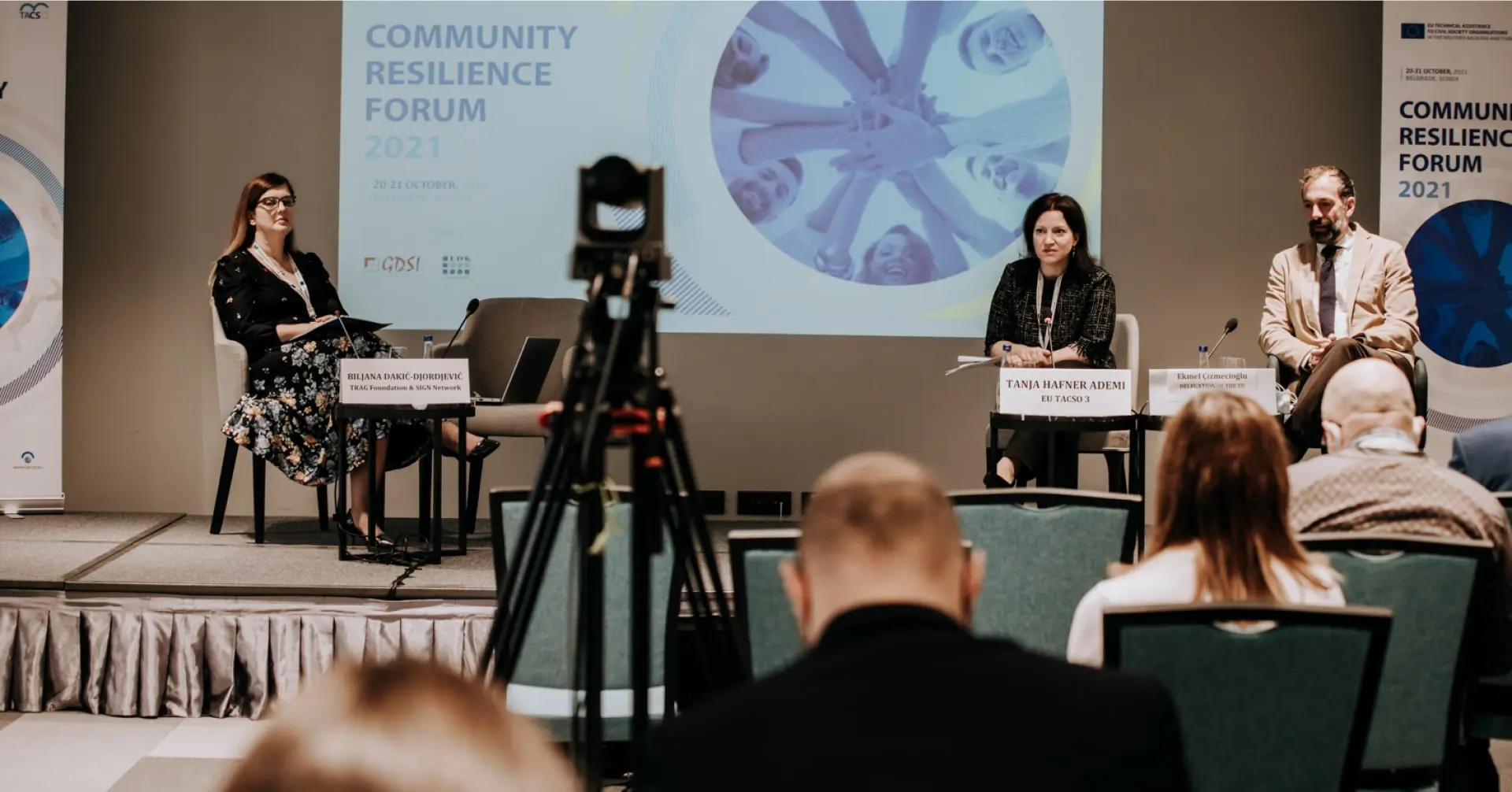
EU TACSO 3 project, organized the regional Community Resilience Forum (CRF) during 20-21 October, 2021 in Belgrade, Serbia, as part of its Capacity Development Programme package.
The Forum addressed one of the most critical issues facing civil society presently – CSOs relation with constituencies and genuine activism. It has been found that, generally speaking, CSOs have detached from their constituencies which affects their legitimacy, relevance and finally their impact. It was, as well, discovered that community-based organisations, those working at the local level, grassroots, informal groups and citizens’ movements are those that have the strongest ties with their constituencies. Commonly, they are able to mobilise citizens, particularly when it comes to issues that are of high interest to citizens and when it comes to small communities. However, new social developments such as political instability and violation of basic freedoms in some of the countries, emergency situation with COVID-19 pandemics etc., change citizens’ priorities and put new challenges in front of CSOs. CSOs, therefore, require new approaches to persist in activism in these turbulent circumstances, including also attention to communication trends that digitalization and new technologies bring.
The Forum had several objectives: to introduce CSOs from the Western Balkans and Turkey (WBT) with new approaches and good practice models to activism and community mobilisation; to support exchange of CSOs practices and skills in citizens’ activism, participation in decision making and community mobilisation; to raise the issue of constituency building and discuss strategies to promote and support activism and community mobilisation in the WBT; as well as to increase ability of CSOs to respond to basic freedom violation.
On both days, the Forum gathered 117 representatives (including 11 virtual) of CSOs, grassroots, community foundations, CSOs providing grants and capacity building for grassroots, networks, women’s CSOs andrepresentatives of the DG NEAR and Delegations from the region, donors, experts and other stakeholders in the area of civil society development in the WBT region.
The Forum enabled participants to share learning, exchange and discuss amongst themselves and think collectively at the regional level of resilient modes of activism, particularly in challenging circumstances. The event also served to bring back the enthusiasm and strategic orientation in rebuilding trust and strengthening relations with key constituencies. Through, the EU TACSO 3 project, the Forum provided the platform for discussion and action planning for civil society stakeholders.
The introductory session featuredrepresentatives of EU TACSO 3 – Team Leader Tanja Hafner Ademi who moderated the session, Liselotte Isaksson – Head of Sector – Civil Society, Social Inclusion and Human Capital, Western Balkans Regional Cooperation and Programmes, DG NEAR, Ekmel Cizmecioglu of the Delegation of the European Union in Serbia and Biljana Dakić Đorđević, Executive Director of Trag Foundation. Two CSO representatives from the EU, Marina Škrabalo and Ivan Blažević from Solidarna Foundation, Croatia addressed the participants and emphasized the importance of connection to constituency as a means of being resilient in turbulent times. Panelists also highlighted the EU financially support to small CSOs through the process of re-granting, also known as Financial Support to Third Parties (FSTP), including a promotion of the publication on best practices in these field: “Enhanced Outreach to CSOs A Collection of Good Practices of FSTP in the Neighbourhood and Enlargement Countries”
Find the Forum Virtual Participation Agenda
Read the Community Resilience Forum Short Report
Find the Photo Gallery here
Find the Press releases here
Find the Forum Panellists and Contributors presentations here
Activism and Digital Activism (Milena Scepanovic)
Belgrade Open School (Milorad Bjeletic)
Capacity building of CSOs in Turkey (Esli Ece Kocak)
Communities Greatest Tool to Overcome Crisis (Uros Bulatovic)
Community-based philantropy (Nathan Koeshall)
CSOs activities during pandemic (Nebojsa Djurasovic)
Digitalization in non-formal education (Ivana Volf)
Financial Support to Third Parties (Gaby Hagmüller)
Importance of adopting Human Rights Based Approach (Aurela Bozo)
Knowing your Constituency Lessons learned (Aleksandar Krzalovski)
Observing the needs of communities (Dajana Bakic)
Observing the needs of communities (Milka Domanovic)
Online Advocacy Tool (Iskra Belcheva)
Pandemic & The Media (Deniz Savas)
Supporting Schools Building Community Resilience (Mario Bajkusa)
Targeting most vulnerable during crisis (Sanja Sisovic)
The role of CSOs in managing FSTP (Tezcan Eralp Abay)
Value of EU financial support to local communities (Dragan Nedeljkovic)
Vulnerability in the time of crisis (Ereandra Robo & Viola Bogdani)
Vulnerability in the time of crisis (Tatjana Stoimenovska)
